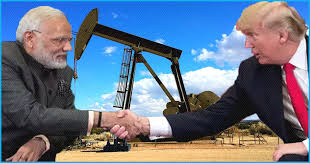
No Reports of Indian Oil Companies Halting Russian Imports, Say Government Sources

 :
| Updated On: 02-Aug-2025 @ 12:57 pm
:
| Updated On: 02-Aug-2025 @ 12:57 pmSHARE
A recent report suggesting that Indian state-run oil companies have halted crude oil purchases from Russia has been strongly denied by government sources. These officials clarified that India’s energy import decisions are driven purely by market forces and national interests, not external pressures. The denial came shortly after U.S. President Donald Trump praised the alleged halt, calling it a “good step” in the ongoing geopolitical tension over countries purchasing oil from Russia.
Government sources reiterated that there has been no official communication or indication from Indian oil firms — such as Indian Oil Corporation, Hindustan Petroleum, Bharat Petroleum, or Mangalore Refinery and Petrochemicals Ltd — about stopping Russian crude purchases. While reports claimed that these firms had not made fresh requests for Russian oil in the past week, the Indian government has made it clear that the country’s energy policy is based on pragmatic calculations of availability, affordability, and national interest.
Responding to queries regarding India’s energy strategy, Ministry of External Affairs spokesperson Randeep Jaiswal reaffirmed that India’s energy decisions are shaped by global market dynamics and the prevailing international situation. “You are well aware of our position. Our approach to sourcing energy is based on what is available in the market and what aligns with our national interest,” Jaiswal said. He emphasized that India continues to act independently in securing its energy needs.
India is currently the world’s largest buyer of seaborne Russian crude oil. This position has come under scrutiny as the United States and its allies increase pressure on nations continuing to trade energy resources with Russia, particularly in light of the ongoing Russia-Ukraine conflict. While acknowledging these pressures, Indian officials stressed the longstanding and stable relationship between India and Russia, which they described as a “time-tested partnership.” Jaiswal emphasized that India values its relationship with Russia while also maintaining a strong and growing partnership with the United States.
Despite the tensions, Jaiswal expressed confidence that India’s bilateral relations with the United States will continue to progress. He underlined that India will maintain a balanced and sovereign foreign policy based on national interests, rather than external pressures or alignments.
The diplomatic tensions escalated when U.S. President Donald Trump, on July 30, announced a 25% tariff on Indian goods and threatened further penalties in response to India’s continued arms and oil trade with Russia. In a sharp criticism of India’s ties with Russia, Trump described both India and Russia as “dead economies” and said he “does not care” about India’s relationship with Moscow.
In the face of these aggressive comments and policy measures, India has stood firm on its strategic autonomy. The government continues to assert that energy security and international partnerships are dictated by the country’s long-term economic and strategic goals. The episode underscores the complex balancing act New Delhi must perform in managing relations with both Moscow and Washington amid evolving global geopolitical shifts.